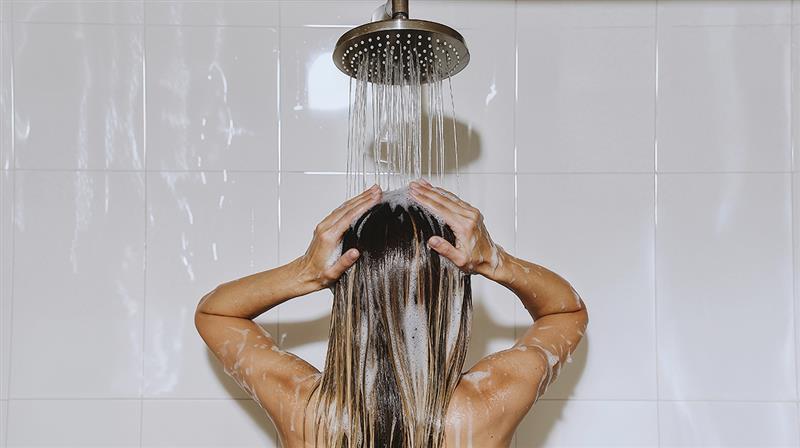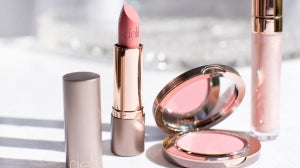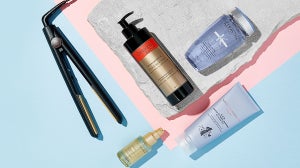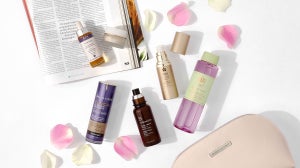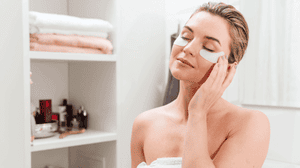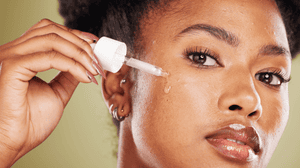
You might have heard the term ‘hard water’ before, and how this is something that may affect our hair. This often-unconsidered phenomenon could be the cause of lacklustre-looking lengths, dry ends or hair that feels more fragile.
Learning how to protect hair from hard water may help transform strands and encourage a visible change.
But what exactly is hard water? And how can we best implement ways to protect our hair? Keep reading to learn more about the naturally occurring water and what can be done to minimise its effects.
What is Hard Water?
Hard water is water that contains high levels of calcium and magnesium minerals.
Although rainfall is soft, when it falls in areas where the bedrock near the water source is made up of porous sedimentary rocks like limestone, chalk and flint, it dissolves the minerals into it.
The phrase itself does not refer to the physical density of water, it refers to it having a high mineral content, and the higher this content the harder the water is considered.
Sometimes, it is possible to spot the signs of hard water, as it may appear as white build-up around faucets, as spots on clean dishes, and as a waxy film residue when you wash your hands.
Where is Most Affected?
Approximately 60% of the UK is considered to have hard water. Based on milligram per litre, the South and East of England is believed to have the hardest water, with cities such as Bath, Bristol and Milton Keynes displaying a high number.
What are the Effects of Hard Water on the Hair?
Hard water reaches our hair when we shower and wash our hair. Exposing our scalp and strands to it frequently may lead to the following:
Colour Fade and Dullness
Hard water is a common cause for dull-looking lengths. For colour-treated hair, especially blonde tones, it may appear more brassy, less shiny and lacking vibrancy. This could be attributed to the minerals in hard water coating the hair follicle, which may make the lengths look more matte.
Dryness
As water evaporates from the hair fibre, the minerals can be left behind. This mineral build-up may leave a film over the strands, making it more difficult for moisture absorption. A lack of moisture could contribute to more noticeable flyaways, split ends and less visible hair elasticity.
Tangles and Breakage
Aside from drying out the hair, (which could make any post-shower tangles more stubborn than they would have been), hard water may cause our hair fibre’s ‘scales’ to stand on end and latch onto one another, becoming tangled together. More tangles means more mechanical brushing, which could contribute to an increase in snapping and hair fall.
Additionally, as the hair becomes drier, it may start to feel more brittle. Without the moisture nourishing the strand, you may notice your hair has a straw-like texture, which could be more prone to breaking easily.
Dry, Itchy Scalp
As a result of the minerals being present when cleansing, shampoos might not always work as effectively. The residue left behind on the scalp could cause some feelings of itchiness and irritation, as it may block your scalp’s oil glands that help to hydrate the roots.
How to Protect Hair from Hard Water
Defending and decalcifying your strands may seem like an uphill feat if you live in a high hard water area. However, there are multiple ways in which you could reduce its impact on your hair.
Use a Clarifying Shampoo
This simple in-shower switch from a regular shampoo to a once-weekly clarifying or detoxifying shampoo may help remove some of those mineral deposits.
Often formulated with sodium lauryl sulfate, an ingredient which works well to cleanse in soft and hard water conditions, clarifying shampoos could remove mineral build-up and other residue from styling products.
Apply Nourishing Treatments
If your hair is feeling the drying effects of hard water, a leave-in mask, conditioner or oil could help replenish lost moisture. Look out for ingredients like hyaluronic acid, known to attract and retain moisture, and shea butter, an emollient that may form a protective seal over the strands.
Install a Water Filter
Installing a water filter is the most direct decalcifying way to protect your lengths. Applied to your shower head, a filter helps to remove contaminants before the water comes out and reaches your hair.
Reduce Hair Wash Days
Reducing your hair wash days (for example, decreasing from three to two times per week) could help your hair and scalp retain more of its natural oils, in turn diminishing dryness. Although it may seem difficult for those devout to multiple washes per week, over time, your hair could adjust and appear less oily less quickly. Plus, the number of times you subject your hair to hard water, the less noticeable the effects might be.
Whether you’re in a high hard water area or not, these tips to reduce its risks and spot the signs could support more nourished-looking lengths.
Not convinced hard water is the culprit for your dry strands? Check out our blogs on how to repair heat-damaged hair and how to protect hair from chlorine.

